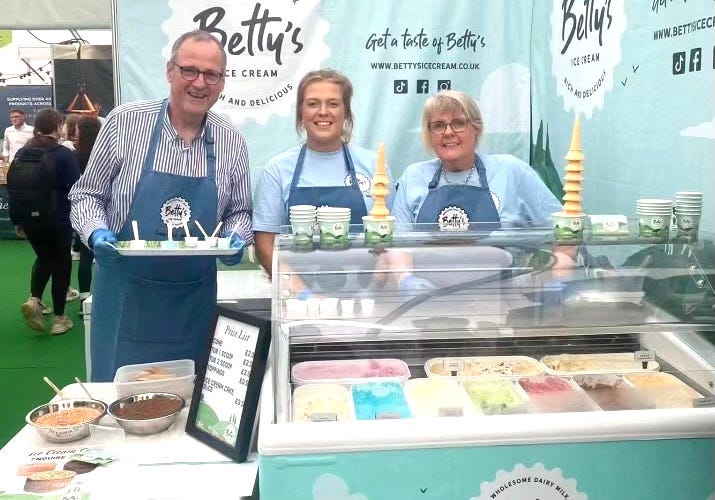Co Tyrone couple transform family farm into an ice-cream business for their daughter
Trevor and Barbara Boyd, alongside their daughter, are the entrepreneurs behind Betty's Ice Cream
Hello and welcome to Entrepreneur NI – a weekly newsletter brought to you every Sunday morning, showcasing how founders created some of the best businesses in Northern Ireland – big, small and everything in between. If you haven’t already subscribed, you can do so here..
The Covid-19 pandemic, and subsequent lockdowns, issued in an era of uncertainty for many businesses. For one Co Tyrone couple, the time was used for self analysis; to take stock of what they wanted from their future – and that too of their daughter’s.
Trevor and Barbara Boyd own a farm in Pomeroy but had been renting it out pre-pandemic. Their daughter, Bethany, was studying Food and Business at CAFRE’s Loughry Campus in Cookstown. Albeit at a different stage in her career to that of her parents, Bethany’s future was also very much at the forefront of her mind.
Renting the farm wasn’t really working out for Trevor and Barbara and they needed to think of something new.
“We come up with this plan to make something out of the farm ourselves,” explained Trevor. “So we ended up putting sheep on the farm and we converted some of the old buildings into a production unit for making ice cream with the view to building a business for Bethany.”
The farm was brought back to life and Bethany had the opportunity to build a business of her own. Betty’s Ice Cream was born. The name comes from Bethany’s nickname – Betty.
Mum, dad and daughter all work on the business, adding their own special ingredients to the mix – a mix Trevor describes as one of “enthusiasm and experience”.
Barbara has a background in retail and procurement, Trevor worked in animal health and Bethany’s studies focused on the business of food.
“We're still in the early days of excitement and potential,” said Trevor. “It does give you a good kick whenever people taste the product and think ‘wow, that's lovely ice cream’; that's what makes you feel that you're onto something.
“Even though there are umpteen types and flavours and varieties of ice-creams out there, you're able to offer a locally produced product that gets people to stand back and take notice. It gives you a degree of satisfaction that, for at least for a percentage of the population, you're hitting the spot for them.”
Once the Boyds decided what they wanted to use the farm for (there were a number of other ideas put on the proverbial table) they set about making their business a reality.
They went to Mid Ulster Council who advised them about the Go For It programme, which offered mentorship and preparation work. Trevor also reached out to his own contacts from previous employment, who were kind enough to advise him on how to approach a market.
They soon became members of Food NI, which helped provide training around unique selling points for their product, where to go to sell it, and what the consumer trends are – what customers are looking for.
The reality of a running a business – while not to be unexpected – soon became apparent.
Said Trevor: “Despite all the thinking through, the challenge and the surprise of it all is the amount of hours that are involved. Barbara and I worked for other businesses and people were assigned particular roles within those businesses.
“Whereas in a startup business, you find that everybody's doing everything. If we were to put an advert online in the morning, we would find it difficult to put together a spec for that job, because at our point in development, whoever's working on the company has such a broad remit. It's not just marketing, it could be sales-marketing, and you'll go to this event and that event, so the challenge is the taking on of a lot of roles, you're juggling a lot of balls at one time in order to try and move the business forward.”
The logical step for Trevor and the business was to look about bringing in students in need of placements. As much as it was experience for the students, it was necessary experience for the young business.
While entering the labour market is becoming harder and harder across all industries for employers, Trevor is not one to speak about problems unless, as he says, you have a solution and the regional colleges and the InnovateUS programme have been good in bridging that gap – offering a solution to a problem.
“It's a challenge for us setting up a business because you're driven by the project, the aspiration and the vision. The hours are longer than an employee is obliged to work and the range of responsibilities is broader that you can often define, so it's depends on whether or not you can find a person who wants to embrace your vision.
“That has been the challenge of entrepreneurs who have gone before us. Often one-person bands have been particularly hard to work for because people have not embraced the same vision for the business as they have.”
It’s not the only difficulty for start-ups. Trevor is proud to be one of the very few ice-cream producers west of the River Bann, with most of the situated in the east but while it’s great to be an outlier in one sense, Trevor uses the point to illustrate just how difficult it is for start-ups in Northern Ireland.
“I suppose the reality is as we're trying to grow the business, everybody else is getting paid, we have part time income because whatever is made in the business basically is going back in to drive that business forward and to make ultimately more efficient.
“A startup business, in practice, is not as efficient as it should be; it's probably as efficient as it can be, with the restraints on it, but if we had different types of equipment, our volume could be higher and our method could be more streamlined and cost effective, but we have to work to get there.
“In terms of funding, what we discovered is that for new startups, there is actually no money available. There is plenty of advice, there's plenty of mentorship, and there's plenty of training but there's nobody saying, ‘oh, that's a brilliant idea, let's throw £5,000 at that and see where you can go’. So in that sense the growth curve is that little bit more drawn out.
“And most lenders now are looking for two years of financial figures. Obviously, they're looking for a positive out of those two years, so it's a challenge for a startup business to show much of the degree of profit within two years.”
This is also a point, Brendan Digney of Machine Eye, made in a previous newsletter.
While funding is not a realistic prospect, Betty’s Ice Cream will have look at other ways to grow capital and that comes through innovation, something Trevor believes the business is already doing.
Currently, the business is looking under the banner of healthier ice cream, and while “ice cream will never be deemed to be healthy product by nature of its composition” there are ways to innovate, says Trevor.
They’ve done that with the introduction of a range that's made with no added sugar.
“That then becomes more attractive to parents with children. It's better for teeth, it's better for preventing obesity; that's a factor in play. We're also then looking at nutritionally enhanced ice cream which would be of benefit to the healthcare sector.”
Malnourishment is still an issue in the healthcare system, which is why Betty’s Ice Cream is conducting research in the use of the lesser used sheep’s milk, alongside the University of Ulster where “there's a big opportunity if we get this right”.
There is a huge potential in the ice cream business and while Betty’s remains a direct to customer brand, predominantly through events, their products are stocked in various farm shops and restaurants. The next step is the bigger retailers.
“Wherever we can get the opportunity to get in front of people, it gives us a chance to tell our story, build brand awareness and sell some ice cream to help pay our bills.
“The day of the corner shops are gone, so to get into shops, you have to be able to deal with a Mace or a Spar and that requires volume and a higher level of environmental health. We’re currently going through the training and developing our business qualifications to meet their criteria. That’s all in the offing.”
And it’s a pretty hectic schedule for three people who work on the business on a ‘part-time’ basis. Trevor admits, that while rewarding, it can be a lot of hard work and strain.
“We're just basically coming off a very busy period and people are tired. You're excited that your business is growing but then we are exhausted. We say to each other, ‘well, how are we going to stick this, or what are we going to do to make this easier? How long does this go on?’
“You also have to walk out of a work environment into a family environment. How do you draw a line between the two. When does the conversation about ice cream stop and become about the family. We were away last week for a holiday and it's important to make the time to get away.
“It's not simple as a startup just to leave everything behind. We are constantly thinking about what we going to do differently, all being well, next year, to avoid some of the pressures we've put ourselves under this year.
“I would say there's tensions that have to be managed; they naturally come with the vision and aspiration to get a new business off the ground.
“For me, it's better to try that not to try at all. And let's acknowledge what entrepreneurs are taking on. One piece of advice I would offer if for aspiring entrepreneurs is to think hard about the implications for you as an individual, the finances, and the family, where there is a family.”
It’s hard work, but when it pays off, it’s usually worth it.










